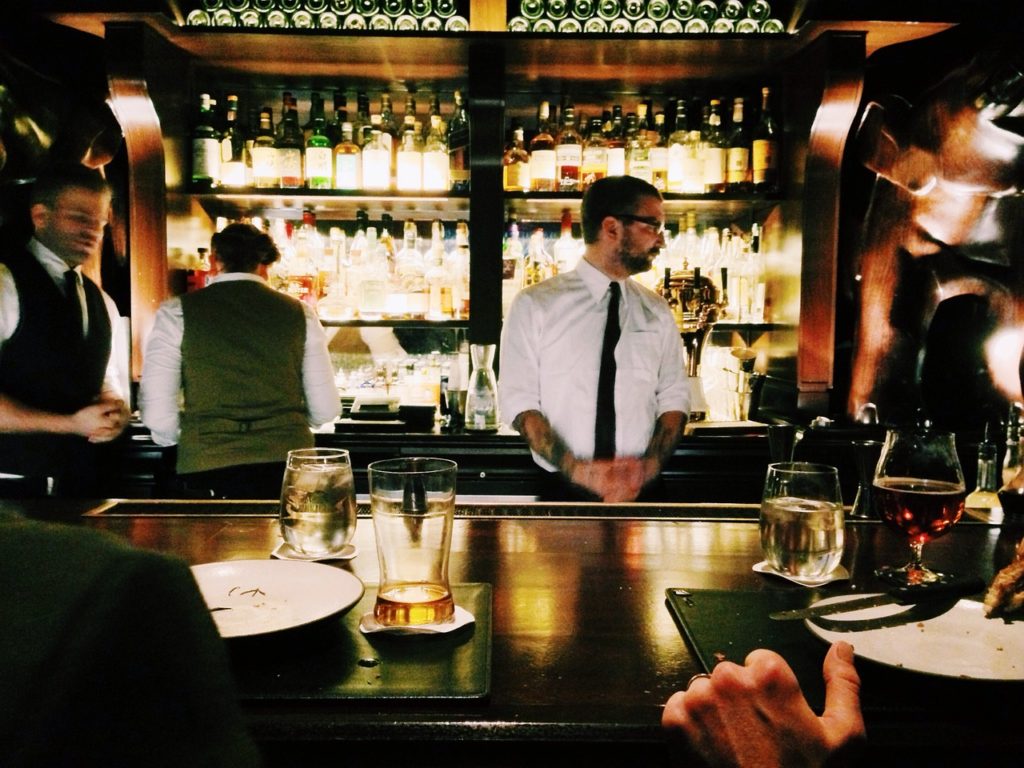
Bar Managers (BM)–or those who are responsible for managing the operations of a bar/beverage service or similar hospitality position–are often leaders who can promote and market the establishment, train/manage wait staff, ensure customer satisfaction, manage inventory, maintain quality assurance, and handle licensing/regulations. Currently, BM opportunities are extensive and can be found in nearly every hospitality-based organization of any size or scale, whether public or private. According to the Bureau of Labor Statistics (BLS), Food Service Management (which includes Bar Management) jobs are estimated to grow 5% by 2024. As the need for hospitality services has accelerated and entertainment has become a mainstay of any consumer’s budget, organizations as far-ranging as lodging, hospitality, event coordination, and food service have massive needs in the field of Bar Management.
Bar Managers often handle interpersonal issues among staff, deal with suppliers/distributors directly, craftthe drink list/menu, and maintain safety/cleanliness standards. BMs should be able to perform menial labor (e.g. heavy lifting, cleaning, etc.), work flexible hours (e.g. nights, weekends, and even holidays), work with/manage a diverse team, and understand the basics of cost/revenue management. BM positions often require quick thinkers who are very efficient with their time and don’t crumble under pressure.
How much does a Bar Manager make?
The average salary for a Bar Manager can vary pretty widely in accordance with location, experience level, and exact job requirements. The lowest salary reported by PayScale was $26,584, while the highest was $53,381, leading to an average salary of $39,983. This variance is largely due to seniority and skil lset, with those with a job description of Assistant Bar Manager garnering between $20,000 -$50,000. Those with Bar Manager in their titles made well over $30,000 a year on average. Unfortunately, salaries for Bar Management are not stellar, but there is opportunity for profit-sharing, tips, and sometimes a flexible work schedule (less than 40 hours/week, days/nights only, etc.). Additionally, there is opportunity in the industry without needing an expensive degree (although it will help).
The Professional Route
The minimum educational requirement for Bar Management is a high school diploma, which means you can enter the industry without first investing in an expensive education. Of course, this also means that you will start at the bottom rung of the ladder and will need to work your way up over several years to achieve the role of Bar Manager. Typically, Bar Manager positions require 1-5 years of experience, so without a relevant educational degree, you will need to earn the experience through relevant employment. Often, you start as a “bar-back”/”runner” who is essentially the bartender’s assistant and responsible for bar cleanliness, stocking the basics, bussing tables, and other menial tasks. Under their tutelage, you eventually replace or work alongside the bartender. Once a bartender, you learn the ins-and-outs of patron management, inventory needs, staff management, and menu-making. Finally, after years as a bartender, you have usually learned the financial and other advanced aspects of a bar and can now be promoted to Bar Manager. For more detail on how to enter the field without experience, check out our post HOW TO BECOME A BARTENDER WITH NO EXPERIENCE.
The Higher Education Route
If you really want to set yourself apart and improve your hiring chances, bachelor’s-level work in Hospitality, Food/Beverage, or Bar Management is a minimum requirement.Often, holding a relevant degree will count toward the required years of experience you see on a job posting. In general, a degree in hospitality services is enough to satisfy the position’s requirements because a good program will teach the basics of finance. It seems that most of the basic, job-specific skills can be learned on-the-job, but the advanced business and analytical skills should be learned through an accredited program. It’s easy for a bar’s hiring manager to know if you have good communication skills during the interview, but it is less clear that you know how to account for supply chain costs. This is where a degree or certificate from a specialized program will lend you credibility.
In conclusion, a Hospitality Management degree in general will benefit you greatly when applying for the role of Bar Manager. There are also specific Bar Management degrees, such as those listed in our ranking of:
- BEST ONLINE ASSOCIATE’S IN HOSPITALITY MANAGEMENT
- BEST ONLINE BACHELOR’S IN HOSPITALITY MANAGEMENT
- BEST ONLINE MASTER’S IN HOSPITALITY MANAGEMENT
The Entrepreneurial Route
Finally, let’s say you are mid-career, cannot commit to a full-length Hospitality program, want to leverage some of your previous educational background, or do not want to start at the bottom of the totem pole. In one of these situations, it may benefit you to simply round out the knowledge you are missing with minimal educational coursework. This route is for someone who perhaps has the business expertise, but not the industry experience, or vice versa. For example, you might be a bartender who seriously lacks accounting/finance skills or a financial analyst who can’t even make a Mimosa. Many Hospitality programs offer electives or special coursework specific to Bar Management, so you could focus on these courses. Otherwise, there are many online course options that are very affordable and take a minimal amount of time to complete. Obviously, this option is not a great substitute for a legitimate degree program or industry experience, but it can give you the edge to land a low-level position. If you are interested in some of the courses available, check out our post A COMPREHENSIVE GUIDE TO ONLINE HOSPITALITY MANAGEMENT COURSES.
